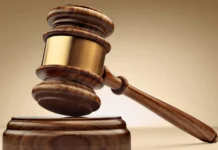President Cyril Ramaphosa’s attempt to set aside and review Public Protector Busisiwe Mkhwebane’s report relating to his CR17 campaign is nothing short of a leader trying to avoid accountability.
The application has failed to establish a proper factual and legal basis for the review.
These are the contentions Mkhwebane makes in her strongly worded responding papers, filed on Thursday in court, to oppose Ramaphosa’s review application.
She says bank statements she received relating to the campaign were obtained lawfully.
Ramaphosa, whom Mkhwebane found to have violated the code of conduct for members of Parliament and the executive, wants the report set aside. He wants the remedial action that he appear before Parliament’s joint committee on ethics and that the matter be referred to the National Prosecuting Authority to be scrapped.
Mkhwebane notes in her response that “essentially, the president founds his case on the following grounds – that the remedial action appropriates the functions of the National Assembly, the National Director of Public Prosecutions [NDPP] and the national commissioner of the SA Police; that I lacked jurisdiction to investigate funds paid to the CR17 campaign; that reliance was placed on an incorrect version of the executive ethics code; and that I violated his right”.
“None of these contentions is borne out by the facts of this investigation. They are all an attempt to obfuscate the matter, to take irrelevant technical points merely to duck the real issues and avoid accountability.”
On the claim of unlawfulness in the obtaining of the bank statements, Mkhwebane argues that “the president offers no evidence whatsoever for this serious accusation”, adding that the accusation has been raised constantly by Ramaphosa’s attorney.
“It has been part of a strategy to create the incorrect impression that I acted unlawfully … No other person would be permitted to get away with the kind of obfuscation contained in the president’s affidavit. If all are truly equal before the law, it should not be permitted by any court.” She says the grounds for seeking a review by Ramaphosa are “unsustainable”.
Mkhwebane argues that she did not dictate what the National Assembly should do.
As part of the remedial action Mkhwebane recommended that “within 30 days of receipt of the report Ramaphosa’s violation of the code of ethical conduct and disclosure of members’ interests be referred to the joint committee on ethics and members’ interests for consideration”.
She contends that this does not equate to her “assuming of having usurped” the powers of the National Assembly or overstepping her office’s constitutional functions “because the National Assembly ought to decide on its own how to respond to any findings made in respect of whether a member is in breach of its rules”.
“My judgment merely requires the speaker to refer the matter to the joint committee on ethics, consider within her discretion whether there should be deliberations on the issues relating.”
With regard to her recommendation that the NDPP should conduct further investigations into the prima facie evidence of money laundering as uncovered during the investigation, Mkhwebane argues that: “The NDPP still has to decide whether or not a particular criminal conduct should be prosecuted. My remedial action merely refers the matter to the NDPP to conduct further investigation.”
She says she was within the confines of the law to refer the matter to the authorities if she felt that the facts in her possession showed that a crime could have been committed.
“There were large sums of money entering and exiting this account. This compounded the alleged suspicion of money laundering. It would have been remiss of me to simply ignore this. If one has regard for the record, which the president has sought and obtained the court’s permission to hide from the public, the following is revealed from the analysis of the information from the FIC [Financial Intelligence Centre]”.
Mkhwebane accused Ramaphosa of “constitutionally questionable conduct” not befitting a head of state and carefully crafting his affidavits “to focus on technical issues, all of which betray an attempt to avoid taking responsibility”.
“I am surprised that the president, who has sought to shine the light in the path of what he calls ‘renewal’ and a ‘new dawn’ for the country, needs persuasion that such transactions for the benefit of a person occupying the position of deputy president of the republic should concern him and may constitute a violation of section 96 of the Constitution,” she said.







